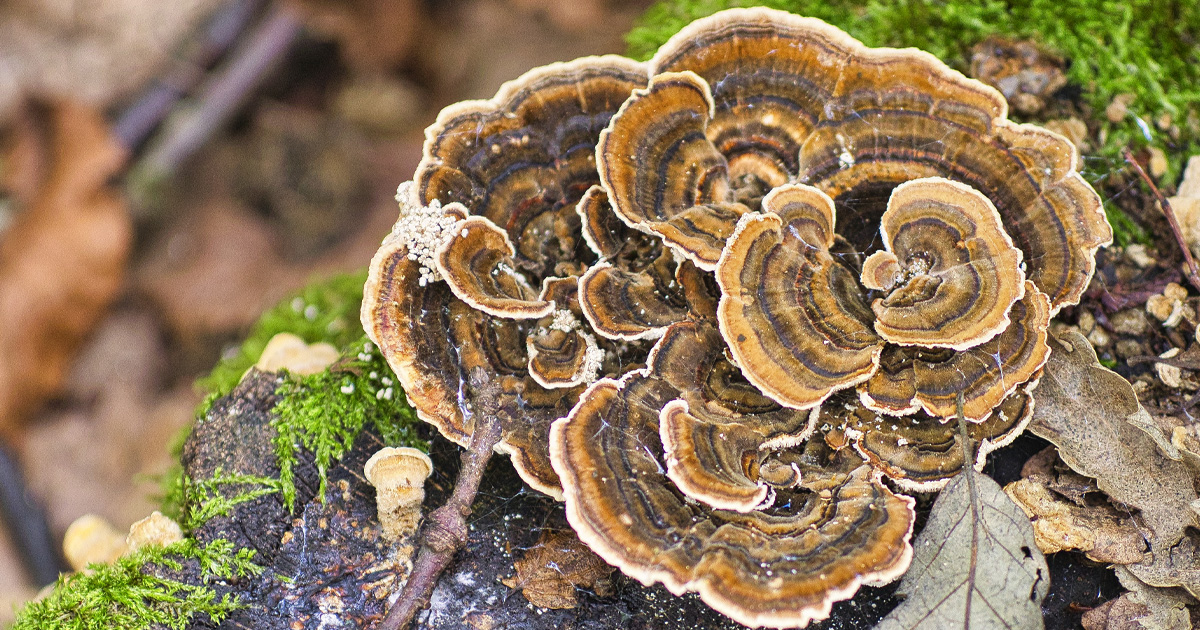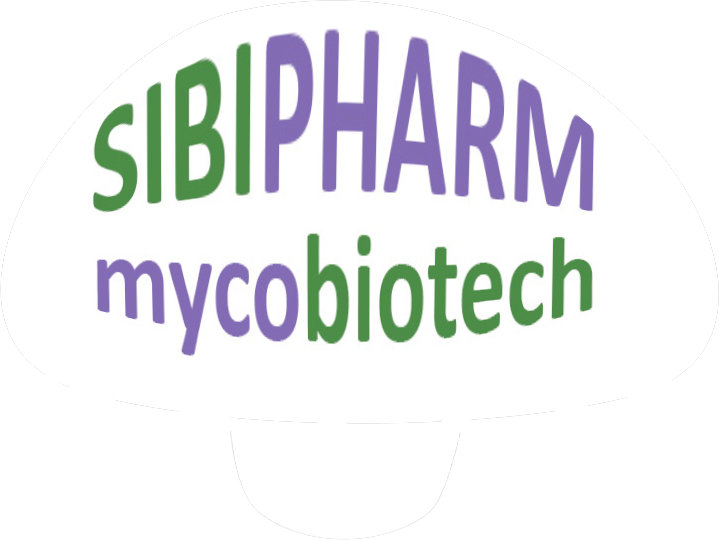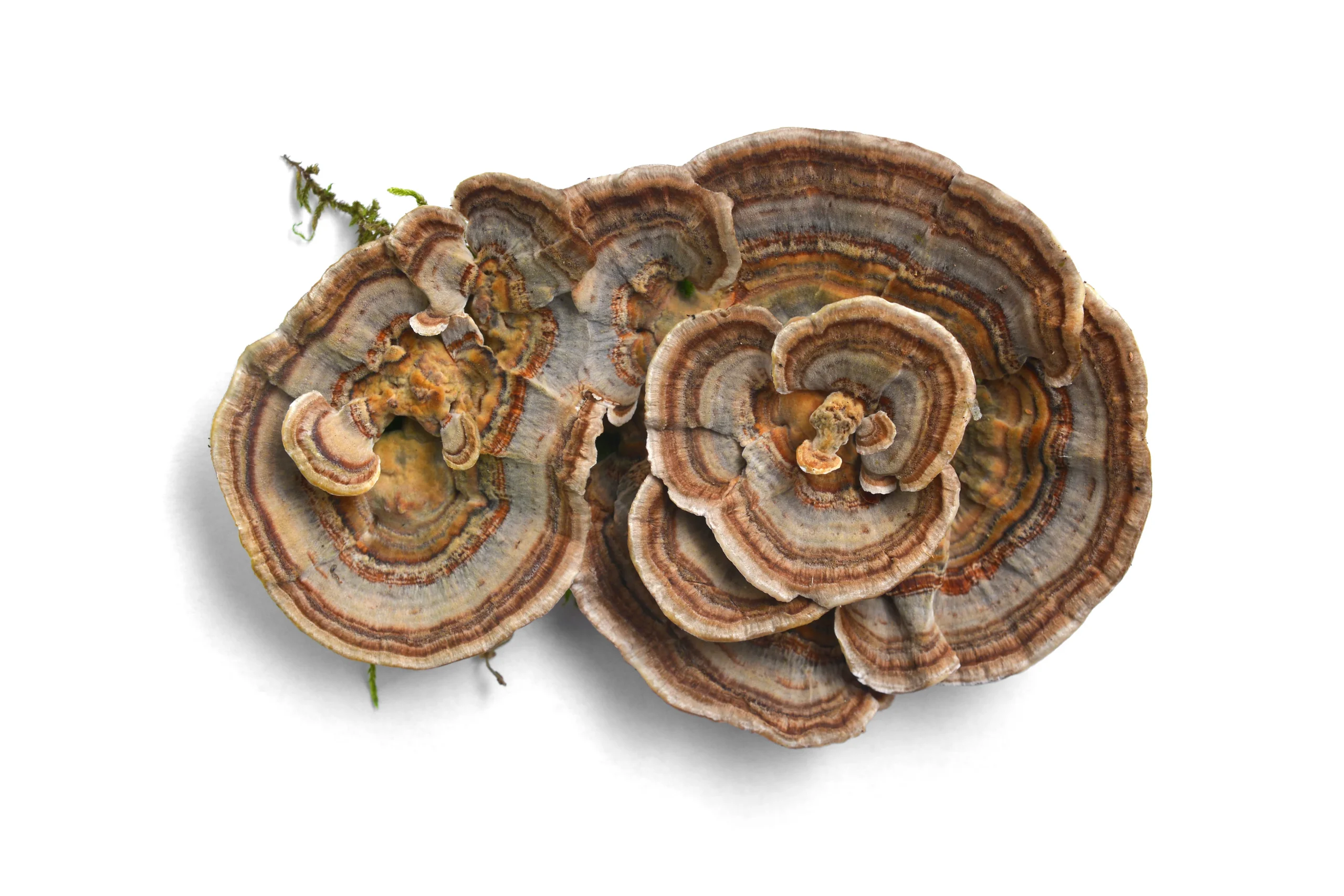Latin name: Coriolus versicolor; Trametes versicolor
The main areas of application of the Turkey Tail mushroom:
- Immune support.
- Antioxidant protection.
- Gut microbiome support.
- Anti-cancer therapy.
- Accelerated recovery from illness.
- Strengthening the cardiovascular system.
- Fighting chronic inflammation.
- Improving cognitive function.
- Antiviral activity.
- Liver protection.
Description of the Turkey Tail mushroom
Turkey Tail (Trametes versicolor or Coriolus versicolor) is a perennial mushroom widely known for its unique healing properties. The appearance of the mushroom is easily recognizable due to its fan-shaped fruiting bodies, which resemble a turkey tail. They are colored in various shades of brown, gray, and white, with alternating rings that create a mosaic effect. The cap diameter is usually between 2 and 8 cm. The surface of the mushroom is often covered with a thin velvety layer, giving it a soft and pleasant to the touch appearance.

Turkey Tail grows primarily on rotting stumps and fallen trunks of deciduous trees, although it can also be found on conifers. It is widespread throughout the world, including North America, Europe, and Asia. This mushroom can be found in both temperate forests and tropical regions. The mushroom prefers damp, shady places and is often found in forest litter, where decaying wood serves as a nutrient medium.
History of the use of the mushroom Turkey Tail in medicine
The history of the use of Turkey Tail for medicinal purposes goes back several centuries. In Chinese medicine, the mushroom is known as “yun zhi” and is used as a powerful remedy for strengthening the immune system. In Japan, this mushroom is called “kawaratake” and is also used to treat various diseases, including cancer. In ancient times, Turkey Tail was used to prepare decoctions that were used to improve overall well-being and maintain vitality. In Europe and North America, the mushroom began to be actively used for medicinal purposes in the mid-20th century, when studies confirmed its beneficial properties.
At the end of the 20th century, thanks to the development of medical technologies, more detailed studies of the active substances of Turkey Tail began. In the 1970s, polysaccharide K (PSK) was isolated from the mushroom in Japan, which became the basis for a pharmaceutical drug used in oncology. At the same time, a drug based on the polysaccharide peptide (PSP) was created in China, which also found wide application in medicine.
The use of Turkey Tail as an immunostimulant has become especially relevant in recent decades, when mushrooms have attracted the attention of researchers and biohackers around the world. The inclusion of Turkey Tail extract in rehabilitation programs after chemotherapy and other types of aggressive treatment has become a widespread practice in Asian countries.
Active substances in the mushroom Turkey Tail
The Turkey Tail mushroom contains a number of active substances, which determine its medicinal properties. The most well-known and studied components are polysaccharides, such as polysaccharide K (PSK) and polysaccharide peptide (PSP). These substances have a powerful stimulating effect on the immune system, activating macrophages and other immune cells, which helps fight infections and tumors.
PSK, also known as christin, is widely used in Japan as an adjuvant in cancer therapy. This polysaccharide not only strengthens the immune system, but also helps suppress the growth of cancer cells, blocking their ability to divide. PSP, isolated in China, also has an immunostimulating effect, but has a wider range of activity, including an antiviral effect.
In addition to polysaccharides, Turkey Tail is rich in triterpenoids, which have a powerful antioxidant and anti-inflammatory effect. These compounds help protect the body’s cells from damage caused by free radicals and reduce inflammatory processes in tissues. The mushroom also contains phenolic compounds, which enhance the antioxidant effect and help improve the cardiovascular system.
Other active components of Turkey Tail include beta-glucans, which are known for their beneficial effects on the intestinal microbiome. These substances stimulate the growth of beneficial bacteria in the intestines, improving digestion and strengthening the immune system. The mushroom also contains sterols and polysaccharides, which help regulate blood sugar levels and have a hepatoprotective effect.
Vitamins were also found in Turkey Tail, including vitamin D, which is necessary for maintaining healthy bones and the immune system. Microelements such as copper and zinc also play an important role in maintaining metabolic processes in the body. The presence of these active substances makes Turkey Tail a unique remedy for maintaining health and preventing various diseases.
Therapeutic Effect for Biohackers
For biohackers looking to optimize their health and improve their physical and mental performance, Turkey Tail mushroom is a real treasure. Including this mushroom extract in your daily diet can significantly improve your overall health and protect you from various stressors.
One of the key benefits of Turkey Tail is its ability to strengthen the immune system. Biohackers who lead an active lifestyle and are exposed to various stressors can greatly benefit from regularly taking Turkey Tail extract. The polysaccharides contained in the mushroom activate the work of immune cells, which helps prevent infections and improve recovery from illnesses. This is especially important in conditions of constant stress, when the immune system can weaken.
The antioxidant properties of Turkey Tail also make it valuable for biohackers. Free radicals that arise as a result of intense physical activity or exposure to external factors can damage the body’s cells, accelerating the aging process. Turkey Tail extract neutralizes these harmful compounds, protecting cells and tissues from damage and slowing down the aging process. Turkey Tail’s ability to support gut health is especially noteworthy. This may be especially important for biohackers looking to optimize their diet and improve their digestion. The beta-glucans in the mushroom promote the growth of beneficial microflora in the gut, improving digestion and increasing overall energy levels. A healthy gut is the key to strong immunity and a good mood, which is important for maintaining high performance.
Turkey Tail’s anti-cancer activity may also be of interest to biohackers, especially those looking to maintain long-term health. Polysaccharide K (PSK) and other components of the mushroom help prevent the development of tumor processes, protecting the body from malignant neoplasms. Regular intake of Turkey Tail extract may be part of a preventive program to protect against cancer.
Turkey Tail may also help biohackers improve cognitive function. The antioxidants in the mushroom help protect nerve cells from damage, improving memory, concentration, and other aspects of cognitive health. This makes Turkey Tail a useful addition to any program aimed at improving mental performance.
Turkey Tail’s medicinal properties also extend to improving the cardiovascular system. The mushroom’s antioxidant and anti-inflammatory components help reduce “bad” cholesterol levels and improve vascular health, which is important for maintaining heart health.
Thus, regular use of Turkey Tail can become an important part of any biohacker’s arsenal, striving to improve the quality of life and maximize the potential of their body.
Disclaimer:
The information provided in this article is for educational and informational purposes only. It is not intended as a substitute for professional medical advice, diagnosis, or treatment. Never disregard professional medical opinion and consult with a specialist.
Scientific articles:
- Trametes versicolor (Synn. Coriolus versicolor) Polysaccharides in Cancer Therapy: Targets and Efficacy.
Habtemariam S.
https://pubmed.ncbi.nlm.nih.gov/32466253/
- Coriolus (Trametes) versicolor mushroom to reduce adverse effects from chemotherapy or radiotherapy in people with colorectal cancer.
Pilkington K, Wieland LS, Teng L, Jin XY, Storey D, Liu JP.
https://pubmed.ncbi.nlm.nih.gov/36445793/
- Immunomodulatory Properties of Coriolus versicolor: The Role of Polysaccharopeptide.
Saleh MH, Rashedi I, Keating A.
https://pubmed.ncbi.nlm.nih.gov/28932226/
- Preclinical and clinical studies of Coriolus versicolor polysaccharopeptide as an immunotherapeutic in China.
Chang Y, Zhang M, Jiang Y, Liu Y, Luo H, Hao C, Zeng P, Zhang L.
https://pubmed.ncbi.nlm.nih.gov/28595034/
- Trametes versicolor (Turkey Tail Mushrooms) and the Treatment of Breast Cancer.
Stamets P.






